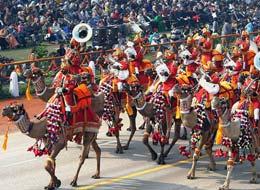India hungry for our natural resources

From coal to forest products , oil and natural gas, India is a making a renewed push for Canadian natural resources to feed its national economy as the country celebrated its 65th Republic Day.
While pomp, pageantry and patriotic fervor were that mainstay of the event this week in India, Canadian businessmen, politicians and university have been busy inking deals and setting up trade partnerships to boost the current US $5 billion trade with India to US $15 billion by 2015.
Leading the charge was India's Ministry of Petroleum and Natural Gas which announced that Indian oil and gas firms will look to "increase their investments and presence in the Canadian Hydrocarbon sector".
As part of the investment push, India's oil consumers will also look to bring in more Canadian crude. With a term contract for deliveries to Indian Oil Corporation apparently well-advanced already.
Analyst said India has been a notably absent player in the Canadian oil and gas sector – a space where Chinese, Japanese and Korean firms have all been increasingly active.
Prizes like the oil sands and the burgeoning liquefied natural gas export business from the Canadian west coast are some of the biggest energy developments going globally.
India is also hoping for access to advanced technology in the services sector like state-of-the-art fracking technology.
In the forest sector, Canada's Minister of Natural Resources, initiated a new investment to support Canada's forest products market development office in Mumbai.
"By opening new markets for Canada's forest sector, our government is helping to create and protect jobs for Canadians in every region across the country,” said Oliver. “Expanding Canada-India trade in forest products will contribute to economic growth and a vibrant Canadian forest industry."
Forest Innovation Investment India is helping Canada expand its forest product trade with India by identifying new opportunities for Canadian wood products and building local relationships.
India has a strong demand for wood that is not currently met through its domestic supply, presenting important opportunities for Canadian wood products. The Mumbai office is showcasing Canadian wood products applications such as office furniture and door and window manufacturing to builders, buyers, and officials. Oliver expects exports in these areas to grow steadily.
The Government of Canada is investing $600,000 through the Expanding Market Opportunities Program to support the ongoing work of FII India. This new investment builds on previous investments of $1.2 million, bringing the Government of Canada's total investment to $1.8 million. FII India is also supported by the Government of British Columbia.
The delegation led by Oliver also signed a Letter of Intent with India’s Minister of Steel and Mines Beni Prasad Verma.
As per the agreement, both countries will develop and expand mutual cooperation, inter alia, through information exchanges in areas of mutual interest including iron ore, coking coal and other steel-making raw materials and encourage bilateral investment in iron and steel-related businesses and industry, including pelletization plants, according to a report in the New Indian Express.
For Indian steel companies, it means access to new sources of much-needed raw materials, and, in turn, perhaps a boost in steel production.
In British Columbia, entrepreneurs can look forward to new opportunities in India now that Simon Fraser University President Andrew Petter has signed a Letter of Intent with Ryerson University and the Bombay Stock Exchange Institute (BSEI).
The BSEI-Ryerson-SFU Accelerator Program India is a five-year agreement between Ryerson, Ryerson Futures Inc., SFU and SFU Univentures to collaborate on a groundbreaking business incubator and associated accelerator program in India.
The agreement, which builds on the BSEI-Ryerson Digital Media Zone established in July 2013, aims to help entrepreneurs more quickly develop and commercialize innovative research and new technologies in both India and Canada.
It lays the groundwork to help young entrepreneurs expand in both the Indian and Canadian markets and provides support and resources for entrepreneurship and professional development education, including student co-op opportunities and mentorship.
“Supporting student entrepreneurship is an important part of our commitment to being Canada’s 'engaged university',” says Petter.
“This unique partnership with the BSEI and Ryerson University will help us extend that commitment both nationally and internationally.”
Petter signed the agreement during a weeklong mission to India to advance existing relationships and forge new partnerships with academia, industry and government.
Canadian International Trade Minister Ed Fast has said that economic diplomacy also had to be a core objective in Canada’s foreign policy plan. Fast said Canada had set its sights on developing nations such as India, the Philippines, Thailand, Malaysia, and Indonesia. Canada joined the Trans-Pacific trade partnership in 2012, which also includes Australia, Brunei, Chile, Malaysia, New Zealand, Peru, Singapore, the US and Vietnam.
Canada, at present, does not have a trade agreement with any Asian country.
Meanwhile, pomp, pageantry and patriotic fervour were in the air as the 65th Republic Day was celebrated across India last weekend with flag hoisting ceremonies, military parades, cultural extravaganzas and pledges to work for a better India.
In New Delhi, India's powerful military punch and rich cultural heritage were showcased at the main Republic Day parade, with chief guest and Japanese Prime Minister Shinzo Abe keenly watching the 90-minute event on Rajpath boulevard in the heart of the city.
It was the coldest Republic Day in a decade at 9.9 degrees Celsius, forcing commoners and dignitaries alike to swathe themselves in layers of protective clothing.
For Prime Minister Manmohan Singh, it was his 10th and probably last Republic Day parade in office as he has announced that he would step down after the general elections.
Leave a comment









